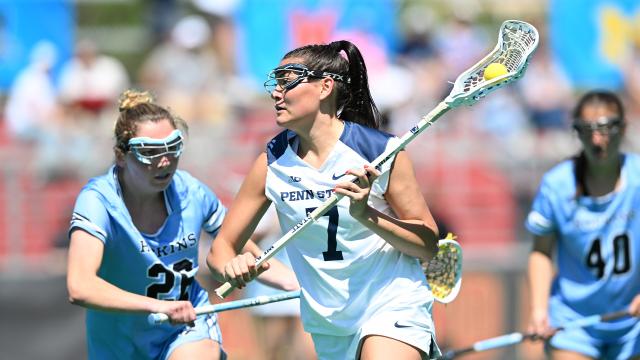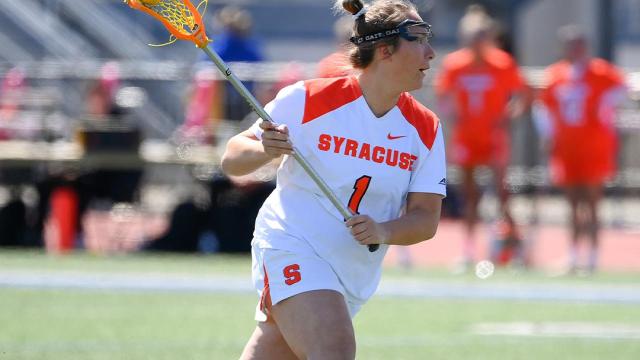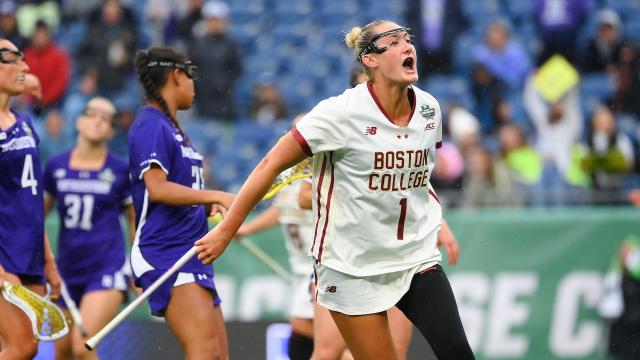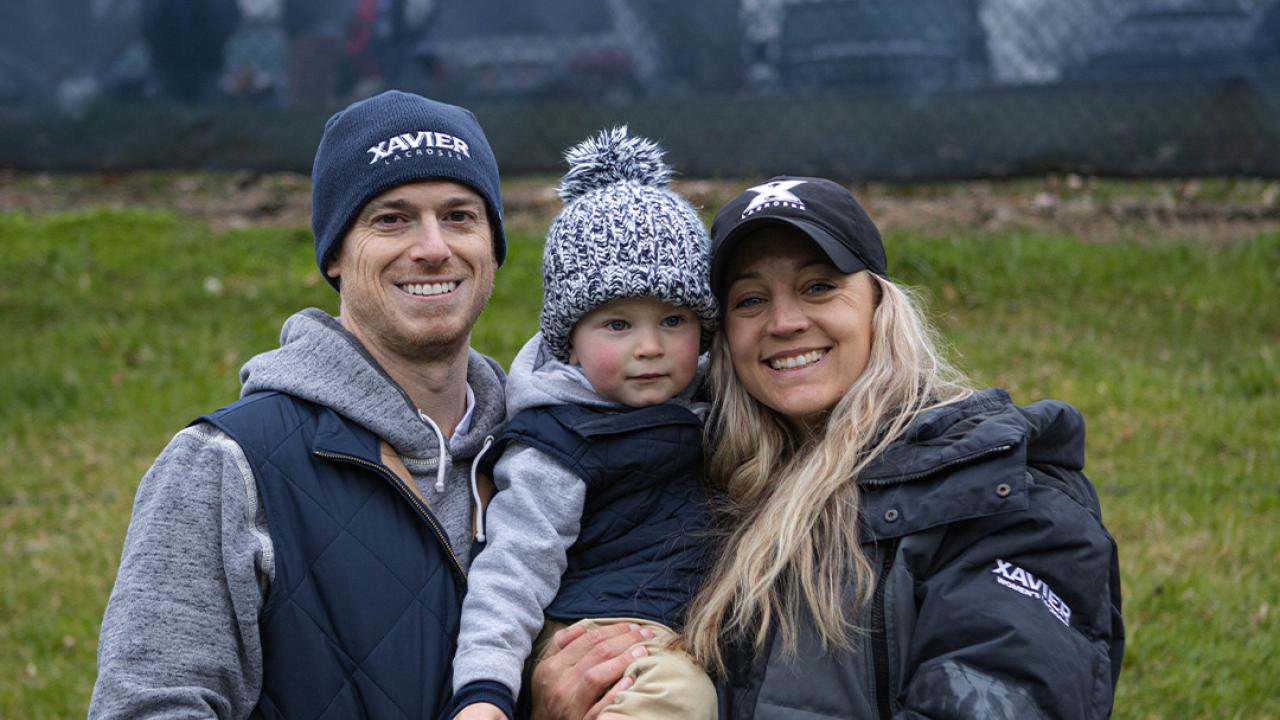
Strength in Numbers: Lacrosse Family Supports Xavier Coach Meg Decker
Meg Decker guided the Xavier women’s lacrosse team through its first season this spring.
With a roster comprised primarily of first-year players, the Musketeers finished 4-10, ending the year with a 22-6 loss to UConn. The sideline celebrated every little victory that game.
The sideline also included a face familiar to anyone who has followed the sport for nearly three decades: Janine Tucker.
Why Tucker was there is part of a half-decade battle Decker has fought alongside her husband, Matt Zink — mostly privately. Decker is telling her story to let anyone else struggling outside the lines know they aren’t alone and because she and her husband want to say thank you.
“[Matt] doesn’t like for people to know he’s sick, but he told me to do this article,” Decker said. “We can’t possibly thank people enough. Maybe this will be a thank you.”
THEY MET AT A WEDDING, of all places, in 2017. They hit it off, but Decker didn’t hear from Zink for months. She found out through mutual friends he had leukemia — a first clue into how private he was about his illness.
But in the spring of 2018, Zink called her “out of nowhere.”
“He hadn’t thought he would make it to his birthday, but he did and was in remission,” Decker said.
Decker and Zink went on their first date on his birthday: June 7, 2018.
Decker was living and coaching in Connecticut, serving as the first head coach in University of Hartford history. Zink was living in Santa Monica, California.
“After our first date, we knew right away,” Decker said. “He moved from California to Hartford by October.”
They bought a house in February 2019, but Zink’s cancer came back that spring. He beat it again.
In January 2020, the couple learned they were expecting their first child.
“It hadn’t been healthy as an option for him or me prior,” Decker said. “He asked, ‘Would you want to have kids if I didn’t make it?’ I was like, ‘Yeah.’ We gave it a shot. We had a little miracle baby.”
Two months later, Decker and Zink heard the “C” word again. This time, it was lung cancer. There was another “C” word on the entire world’s mind — COVID, a mysterious respiratory virus that would upend their lives in ways they haven’t fully recovered from.
“Having a spouse with lung cancer during a [respiratory virus pandemic] was terrifying,” Decker said. “COVID isolated everybody, but we didn’t leave the house.”
Their pandemic baby, Jaxon, was born happy and healthy in October 2020.
SIX MONTHS LATER, Decker heard some rumblings that Xavier would start a women’s lacrosse program. Zink’s ears perked up.
“He grew up in Syosset (N.Y.) and rooting for the Mets, Jets and Knicks,” Decker said. “The Big East [basketball championship] would get played at the Garden. He would go to Knicks games, and his parents used to bring him to Big East basketball games, and he’d see Xavier play. I had no idea. I grew up without a TV. He was like, ‘Big East basketball is a big deal. The fact that they are starting a program is big.’”
Three days later, Decker got a call from an Ohio number.
“‘I don’t know anyone in Ohio,” Decker said. “Xavier is in Ohio. I thought, ‘What are the odds?’”
Pretty good. It was Xavier. Decker thought the department was just trying to pick her brain. She started the program at Hartford, was an assistant at VCU during its first season and was a freshman during Navy’s inaugural campaign before transferring to Loyola.
In short, she knew about first-year programs.
“At the end of the call, he was like, ‘Would you interview?’” Decker said.
The timing couldn’t have left her more conflicted. She had an infant. Zink’s cancer wasn’t in remission. But he wanted her to go.
“Matt was like, ‘Just go on the interview.’ I was like, ‘I’ll give it a shot,’” Decker said. “The people were so kind I thought I was being Punk’d.”
As nice as they were, Decker didn’t discuss Zink’s diagnosis during the interview.
“People question when you’re just a mom, let alone a caretaker and the only working parent,” Decker said. “I didn’t like the vulnerability.”
But after Decker accepted the job, Xavier asked for Zink’s resume. They wanted to see if they could help him land a job there. That’s when Decker had to get vulnerable.
“I had to let them know that he hadn’t been able to work for the last two years and why,” Decker said. “They genuinely didn’t know what to say, and they didn’t try to say anything … It was just, ‘What can we do? How can we help?’”
Decker needed a good bit of help. The pandemic may have been “over” for some, but it still posed a risk to Zink. She needed to mask in her office, remove her clothes, put them in a plastic bag and shower before going home. She’d travel separately until further notice. No one said a negative word, and they all respected Decker and Zink by not spreading the word to others about his illness, either.
Last year, Zink learned he qualified for a multi-phase clinical trial. If it worked, he’d be cancer-free. If it didn’t, he’d die.
“He was like, ‘I’m done fighting. I don’t want to draw things out anymore. I want to be cancer-free or give it my best shot. It’s just a really hard way to live,’” Decker said. “We went all in.”
That spring, Zink’s organs started failing.
“I’m sitting there with my then one-and-a-half-year-old, watching him die on the couch,” Decker said. “It was the worst thing that has ever happened to me.”
Decker’s mom and sisters arrived within three hours to keep her company, expecting Zink would die peacefully at home. But he made a comeback.
“All of a sudden, his body turned back on and he got up,” Decker said. “It was the wildest thing.”
NOTHING CAN PREPARE YOU for losing someone to cancer — and Decker’s role as a working mother added weight to the load. She looked down the pike and knew that if anything happened in 2023, she’d have to leave the Musketeers to be with her family.
In the middle of drawing up X’s and O’s for fall ball — and her own will, just in case — Decker had to think about safety nets for the program. To truly be there for her husband and son, Decker needed help. She needed to offload some of the burden, which meant more people needed to know about Zink.
Decker’s first call was to IWLCA president Liz Robertshaw. Robertshaw had heard through the grapevine about Zink’s illness but not about the entire story, including his brush with death in the spring.
“My immediate human reaction was, ‘Oh my God, I’m sorry you are going through this,’” Robertshaw said. “She was like, ‘I appreciate that. I’m dealing. I’m trying to focus right now. I’ve got to make plans,’ which is very Meg.”
Robertshaw knew the lacrosse community would rally behind her. But she had never personally dealt with something quite like this. So, she suggested she speak with J.L. Reppert, the men’s lacrosse coach at Holy Cross. Reppert had recently lost his wife, Jill, to brain cancer. Decker was hesitant at first — it had only been three months since his wife had died, and she didn’t want to rip a BandAid off. But people encouraged her to reach out, saying he wanted to help.
It wasn’t lip service. Reppert was happy to lend an ear and hand. He, too, was intensely private about his wife’s illness until he realized he had to ask for help and received it in spades from organizations like the HEADStrong Foundation, created by former Hofstra player Nicholas Colleluori from his hospital bed after being diagnosed with terminal cancer.
“For me, it was a little bit of giving back and a little bit of letting her know that it’s not all your burden,” Reppert said. “In some ways, the more you get to talk about your situation, it’s a little bit of a healing process. If you know you are helping someone else along the way, it can be a little bit better.”
Decker’s biggest questions: How should I tell the team? Should I even tell the team? Is it fair? Reppert got it.
“She has her 35 daughters or however many on the team,” Reppert said. “They care. They don’t know what to do. It’s a lot of things to balance and weigh.”
But Decker was concerned she’d weigh her team down.
“Young women have a tendency, in a beautiful way, to try to take care of you,” Decker said. “I didn’t want them to stop asking me for help or leaning on us as coaches or talking to us about what’s going on in their life. I wanted them to know that what I was going through wouldn’t take away from their experience.”
Reppert told Decker that, in a roundabout way, she’d actually be teaching them something by being honest.
“He encouraged me by saying, ‘Life is hard. It’s OK that it’s hard. Being honest with them will give them a chance to learn what you’re going through without going through it themselves ... It’ll give them tools [to deal with tough challenges],’” Decker said. “I’m a teaching coach. That I could do. I just didn’t want their attention to shift.”
But Decker knew her attention might need to shift with Xavier likely playing its final game of the season on the road April 29 at UConn. Her assistant, Grace Beshlian, graduated from UConn in 2020. She was hesitant to take on an interim head coaching job so young, and Decker wanted to ensure Beshlian and the players had the proper support.
Again, Decker called Robertshaw.
“She was very mindful,” Robertshaw said. “It wasn’t just pulling a body in to coach a game. It was wanting someone who could be strong for her, the team and moving things forward in a positive direction, which is also very Meg.”
One name came to mind right away.
“I was like, ‘You’re looking at Janine Tucker,’” Robertshaw said. “I have seen in Janine the kind of strength I have seen in Meg.”
And that’s how Tucker ended up on the sidelines, despite retiring from coaching after the end of the 2022 season and a decorated career at Johns Hopkins. Tucker has since served as an executive head coach at Gardner-Webb, mentoring another pair of recent college graduates in Maddie Martin and Lauren Deaver.
“She didn’t even ask what I needed,” Decker said. “She just said she’d do it. I just started bawling.”
Decker wasn’t the only one crying.
“As she’s speaking to me, my eyes are trying to swell up,” Decker said. “I am trying to take it all in. ‘I am of the mindset that you and I coach very similarly … I just want your style. I want your energy. I want you to be able to be with my girls. That would put my heart at peace.’”
Decker needed assurance that Tucker could step in if she had to step away. Tucker checked with Gardner-Webb. There were no issues — only questions as to how they, too, could help.
For Tucker, it was another way to honor her mentor, Diane Geppi-Aikens, who coached at Loyola while undergoing brain cancer treatment and died in 2003. Tucker gave the eulogy — one of the first of many ways she’s tried to honor her late friend’s memory over the last two decades.
“I watched [Diane] battle and persevere and, like Meg, not feel sorry for herself,” Tucker said. “She knew she had an obligation to her family and team, her young women, and she was giving it all she could because that was what was in her heart. I saw so many similarities between Diane and Coach Meg, her strength and how she carries herself.”
Decker’s players lit candles and said prayers. Beshlian and director of operations Erin Rubright reminded her to feed herself, not just her Jaxon. Old friends from VCU and Hartford reached out. So did the HEADstrong Foundation, Furman coach Kirkland Lewis and American assistant Mary Eames.
Frankly, there are too many people to name because cancer has, unfortunately, touched almost all of us. The stories Decker heard from club coaches, high school coaches and current and former colleagues helped her realize she wasn’t alone in this fight. She never was.
“I’ve been in this community for well over 30 years,” Robertshaw said. “It’s grown, which is a good thing, but there is no denying how close-knit it is. It’s unspoken. It’s like, ‘Somebody needs help, jump in.’”
And no one cheered harder for the Musketeers than Zink, even from afar. Decker would get back from road games, and all he wanted to do was break down plays. He pored over stats and analytics for her.
“He’s the biggest Meg Decker lacrosse fan ever,” Decker said. “The hope for the program and me as a coach — he believes in it.”

PHOTO COURTESY OF MEG DECKER
Matt Zink teaches his son, Jaxon, how to hold a lacrosse stick.
Decker was able to be on the sidelines for Xavier’s final game of its first season. Tucker came, too, to support one of her own. It started with a week of practice — and a hug.
“We hugged forever, and then we said, ‘Alright, let’s get to work,’” Tucker said.
And they did. Tucker and Decker are natural competitors, and Tucker had to step outside herself during the game and look past the scoreboard. What was unfolding was about far more than lacrosse but also all about lacrosse.
“It was one of the most powerful coaching experiences I have had in my life,” Tucker said. “In the weirdest way, I felt I had been coaching next to Meg forever. I was just there … I didn’t have to do much. She did everything. Grace did everything. The team did everything. Every goal we scored was like we won the national championship.”
WHEN THE FINAL WHISTLE BLEW, Katie Woods, who had learned of Zink’s diagnosis, and the rest of the Huskies also hugged Decker forever. Knowing firsthand how difficult it can be for women to ask for help, Tucker wanted the Musketeers to take in what was happening.
“I turned to the team and said, ‘This is how we do this. This is how we support each other in this lacrosse family,’” Tucker said.
Tucker hopes the rest of the lacrosse community sees it, too. As the game continues to grow and become more competitive, she hopes family remains at the heart of it.
“Just like with sibling rivalry, there needs to be love and joy as the foundation for what we have as players and coaches,” Tucker said. “I saw that with Diane. I try to live my life like that, with as much love and joy but with high expectations.”
It’s a community that Reppert continues lean on, less than a year after losing his wife.
“There are people outside of the community that don’t necessarily see it, and you get those stereotypes and perceptions … but we have an awesome community of lacrosse people,” Reppert said. “It really is inspiring to see. There are so many people who want to help, whether it’s a spouse battling cancer or mental health. Whatever it is, there is a bond and a family atmosphere within lacrosse. People need to know it’s here.”
Decker knows that now more than ever. She isn’t precisely sure what to expect next. She’s currently straddling two extremes. Zink could be cancer-free by early summer. He could also be gone. She’s getting help from her in-laws and continues to be lifted up by the lacrosse community.
“We’re not meant to go at it alone,” Decker said. “It’s OK and so necessary to have a community. Lacrosse has been that community for us, and so has Xavier in a way that has been so powerful.”
Decker hopes her team of women sees that. But she also hopes her son sees that he’s never alone, too. Most of all, she hopes Jaxon — one way or another — knows his dad.
“I hope he will live long enough to know this himself what an incredible human being [his dad] is,” Decker said. “He is so kind, smart, funny and direct and as Long Island as Long Island can get. He has that sharp charm to him and has taught me more about life and myself and people than I possibly could have imagined.”
Including that there’s strength in getting support.
Beth Ann Mayer
Beth Ann Mayer is a Long Island-based writer. She joined USA Lacrosse in 2022 after freelancing for Inside Lacrosse for five years. She first began covering the game as a student at Syracuse. When she's not writing, you can find her wrangling her husband, two children and surplus of pets.
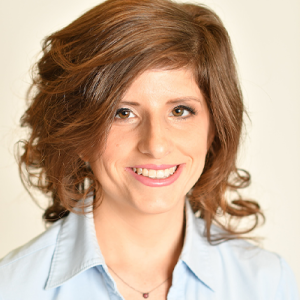
Categories
Tags
Related Articles
